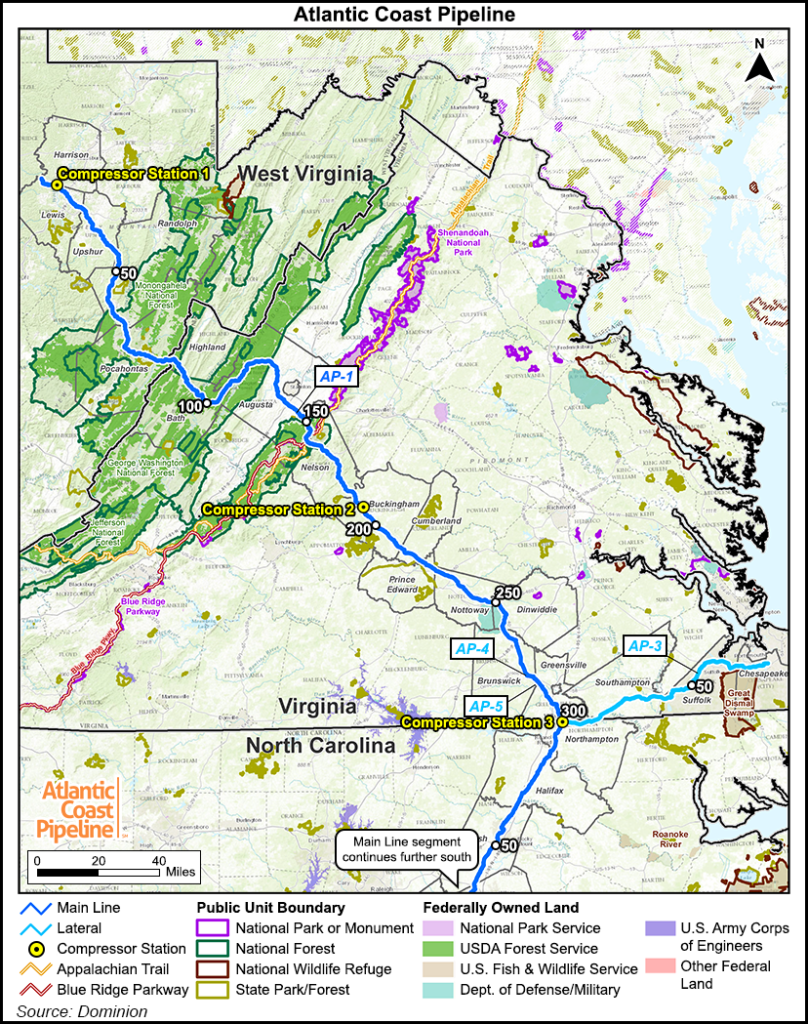Infrastructure | NGI All News Access
Central VA County Eyes Atlantic Coast Pipeline Lateral as Economic Development Tool
Several parties are close to a deal that would see an industrial customer in central Virginia tap into natural gas from the proposed Atlantic Coast Pipeline LLC (ACP), laying the groundwork for future development along the pipeline’s route as it continues to seek regulatory approval.

Under the proposal Columbia Gas of Virginia would supply Dillwyn, VA-based Kyanite Mining Corp. via a lateral in Buckingham County, VA, near a new compressor station ACP plans to build in the county. The county would have the option to purchase about 200 acres along the lateral to market for development, according to a statement from Buckingham County Attorney E.M. Wright at a recent meeting of the county’s board of supervisors.
Buckingham County Administrator Becky Carter told NGI via email that an agreement “giving the county the authority to market a large tract” of property with natural gas available via the proposed lateral “will spur future development to attract more jobs and tax base to our county.”
Carter said the supervisors have voted to move forward on the proposal, with details still being worked out before the county decides whether to execute a formal agreement.
Columbia spokesman Robert Innes said the utility, which serves 250,000 residential, industrial and government customers across central and southeastern Virginia, has “been working with the county, the company and of course the Atlantic Coast Pipeline folks to determine what it would take to bring natural gas to Kyanite, and there are still many moving parts.
“…In general we’re supportive of the Atlantic Coast Pipeline. It provides additional potential natural gas supply to Virginia,” Innes said. “Hopefully it adds to the economic vitality of the area it covers. If the proposed pipeline gets built, this may be a good opportunity not only for Buckingham but for other parts of the state.”
Meanwhile, the board of supervisors next month will consider a special use permit for the compressor station ACP plans to build in Buckingham County, Carter said. The county’s planning commission last week voted 7-0 to recommend approval of the permit, with one member, a Dominion Power employee, abstaining.
ACP is a joint venture backed by Dominion, Duke Energy Corp. and Southern Company Gas.
ACP, a 1.5 Bcf/d, 600-mile mega-project proposed to move Appalachian gas across the West Virginia/Virginia mountains to meet heating and electric generation demand in the Southeast, has faced vocal opposition from some landowners along its route.
Among other concerns, opponents have frequently argued that the communities along the construction path would not benefit from the pipeline’s supply of natural gas, with utilities in southeastern Virginia and North Carolina subscribing to much of ACP’s capacity.
ACP spokesman Aaron Ruby told NGI that the proposal in Buckingham County “is a great example of how the Atlantic Coast Pipeline can serve as an economic development tool for counties to support their local businesses and even attract new industries to help grow their economies.” Ruby said the arrangement with Columbia and Kyanite has been more than two years in the making.
“More work remains to be done to finalize the agreement, but we’re very pleased with the progress that has been made,” Ruby said. “This is an exciting opportunity for the residents and businesses of Buckingham County, and we look forward to continuing to work with all parties to make this great concept a reality.”
Ruby said a similar plan to use ACP to attract manufacturers and industrial customers is being contemplated in Isle of Wight County, VA, in the southeastern part of the state.
ACP filed for FERC approval in September 2015 and is awaiting a draft environmental impact statement after a substantial route change requested earlier this year by the U.S. Forest Service.
Dominion CEO Thomas Farrell recently said the pipeline’s original target in-service date of 4Q2018 has been pushed back to 2019 on account of the Federal Energy Regulatory Commission’s environmental review timeline. The Commission said it plans to issue a final environmental impact statement for the project on June 30, 2017.
© 2024 Natural Gas Intelligence. All rights reserved.
ISSN © 1532-1231 | ISSN © 2577-9877 |
